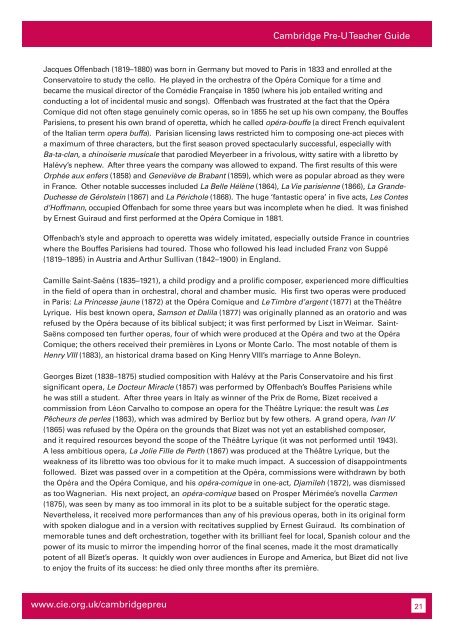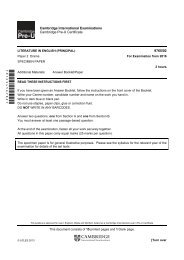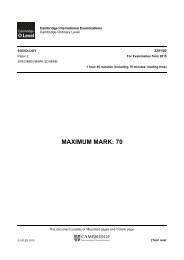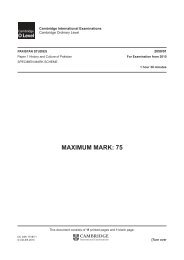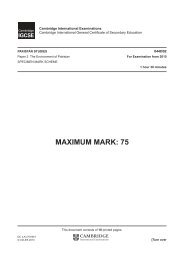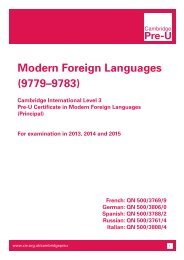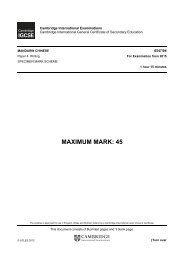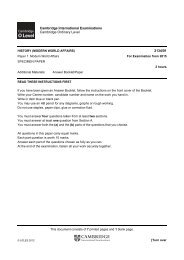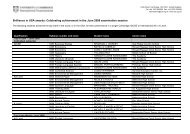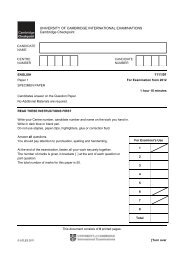Teacher's Guide Cambridge Pre-U MUSIC Available for teaching ...
Teacher's Guide Cambridge Pre-U MUSIC Available for teaching ...
Teacher's Guide Cambridge Pre-U MUSIC Available for teaching ...
Create successful ePaper yourself
Turn your PDF publications into a flip-book with our unique Google optimized e-Paper software.
<strong>Cambridge</strong> <strong>Pre</strong>-U Teacher <strong>Guide</strong><br />
Jacques Offenbach (1819–1880) was born in Germany but moved to Paris in 1833 and enrolled at the<br />
Conservatoire to study the cello. He played in the orchestra of the Opéra Comique <strong>for</strong> a time and<br />
became the musical director of the Comédie Française in 1850 (where his job entailed writing and<br />
conducting a lot of incidental music and songs). Offenbach was frustrated at the fact that the Opéra<br />
Comique did not often stage genuinely comic operas, so in 1855 he set up his own company, the Bouffes<br />
Parisiens, to present his own brand of operetta, which he called opéra-bouffe (a direct French equivalent<br />
of the Italian term opera buffa). Parisian licensing laws restricted him to composing one-act pieces with<br />
a maximum of three characters, but the first season proved spectacularly successful, especially with<br />
Ba-ta-clan, a chinoiserie musicale that parodied Meyerbeer in a frivolous, witty satire with a libretto by<br />
Halévy’s nephew. After three years the company was allowed to expand. The first results of this were<br />
Orphée aux enfers (1858) and Geneviève de Brabant (1859), which were as popular abroad as they were<br />
in France. Other notable successes included La Belle Hélène (1864), La Vie parisienne (1866), La Grande-<br />
Duchesse de Gérolstein (1867) and La Périchole (1868). The huge ‘fantastic opera’ in five acts, Les Contes<br />
d‘Hoffmann, occupied Offenbach <strong>for</strong> some three years but was incomplete when he died. It was finished<br />
by Ernest Guiraud and first per<strong>for</strong>med at the Opéra Comique in 1881.<br />
Offenbach’s style and approach to operetta was widely imitated, especially outside France in countries<br />
where the Bouffes Parisiens had toured. Those who followed his lead included Franz von Suppé<br />
(1819–1895) in Austria and Arthur Sullivan (1842–1900) in England.<br />
Camille Saint-Saëns (1835–1921), a child prodigy and a prolific composer, experienced more difficulties<br />
in the field of opera than in orchestral, choral and chamber music. His first two operas were produced<br />
in Paris: La Princesse jaune (1872) at the Opéra Comique and Le Timbre d’argent (1877) at the Théâtre<br />
Lyrique. His best known opera, Samson et Dalila (1877) was originally planned as an oratorio and was<br />
refused by the Opéra because of its biblical subject; it was first per<strong>for</strong>med by Liszt in Weimar. Saint-<br />
Saëns composed ten further operas, four of which were produced at the Opéra and two at the Opéra<br />
Comique; the others received their premières in Lyons or Monte Carlo. The most notable of them is<br />
Henry VIII (1883), an historical drama based on King Henry VIII’s marriage to Anne Boleyn.<br />
Georges Bizet (1838–1875) studied composition with Halévy at the Paris Conservatoire and his first<br />
significant opera, Le Docteur Miracle (1857) was per<strong>for</strong>med by Offenbach’s Bouffes Parisiens while<br />
he was still a student. After three years in Italy as winner of the Prix de Rome, Bizet received a<br />
commission from Léon Carvalho to compose an opera <strong>for</strong> the Théâtre Lyrique: the result was Les<br />
Pêcheurs de perles (1863), which was admired by Berlioz but by few others. A grand opera, Ivan IV<br />
(1865) was refused by the Opéra on the grounds that Bizet was not yet an established composer,<br />
and it required resources beyond the scope of the Théâtre Lyrique (it was not per<strong>for</strong>med until 1943).<br />
A less ambitious opera, La Jolie Fille de Perth (1867) was produced at the Théâtre Lyrique, but the<br />
weakness of its libretto was too obvious <strong>for</strong> it to make much impact. A succession of disappointments<br />
followed. Bizet was passed over in a competition at the Opéra, commissions were withdrawn by both<br />
the Opéra and the Opéra Comique, and his opéra-comique in one-act, Djamileh (1872), was dismissed<br />
as too Wagnerian. His next project, an opéra-comique based on Prosper Mérimée’s novella Carmen<br />
(1875), was seen by many as too immoral in its plot to be a suitable subject <strong>for</strong> the operatic stage.<br />
Nevertheless, it received more per<strong>for</strong>mances than any of his previous operas, both in its original <strong>for</strong>m<br />
with spoken dialogue and in a version with recitatives supplied by Ernest Guiraud. Its combination of<br />
memorable tunes and deft orchestration, together with its brilliant feel <strong>for</strong> local, Spanish colour and the<br />
power of its music to mirror the impending horror of the final scenes, made it the most dramatically<br />
potent of all Bizet’s operas. It quickly won over audiences in Europe and America, but Bizet did not live<br />
to enjoy the fruits of its success: he died only three months after its première.<br />
www.cie.org.uk/cambridgepreu 21


